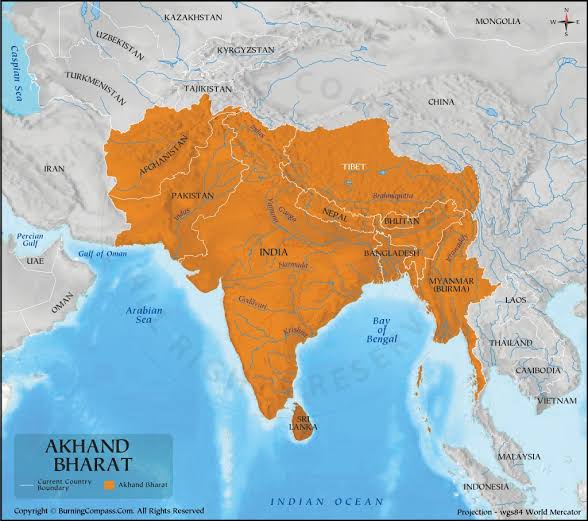The concept of “Akhanda Bharat” (Undivided India) has been a recurring theme in the political discourse propagated by the so-called Hindu Right-Wing party, Bharatiya Janata Party (BJP). This idea envisions a grand, united India that stretches from Afghanistan in the west to Myanmar in the east, and from Tibet in the north to Sri Lanka in the south. Even more ambitiously, it is claimed to encompass vast regions of Central Asia, Russia, and parts of Southeast Asia. Such a vision, while invoking a sense of historical pride, remains a utopian fantasy in today’s geopolitical reality.
The Origins of Akhanda Bharat
The concept of Akhanda Bharat stems from an interpretation of the subcontinent’s ancient history, when large swathes of this region were united under powerful empires like the Maurya and Gupta dynasties. However, even in these periods, the idea of a unified “India” was more symbolic than actual. Various kingdoms, tribes, and regions operated independently under a loose network of influence. Thus, while the idea of Akhanda Bharat may appeal to those who idealize a unified past, it is based on a romanticized and historically inaccurate portrayal of the subcontinent’s political landscape.
Why Akhanda Bharat is Impractical in Today’s World
In today’s global geopolitical structure, nation-states are defined by internationally recognized borders, legal frameworks, and sovereignty agreements. The notion of an Akhanda Bharat, which claims half of Asia, is both impractical and impossible for the following reasons:
1. Geopolitical Realities: The countries that form the imagined Akhanda Bharat—Pakistan, Afghanistan, Bangladesh, Sri Lanka, and others—are sovereign nations with their own governments, cultures, and international alliances. The idea of dissolving their borders to recreate an ancient civilization is not only unrealistic but also politically dangerous. Such a pursuit would lead to massive international conflicts, and no nation would surrender its sovereignty to another based on historical claims.
2. Diplomatic and Military Limitations: India, despite its growing global stature, faces significant challenges in managing its own borders. India has been unable to reclaim Pakistan-occupied Kashmir (POK) or Aksai Chin from China, areas which are internationally recognized as disputed territories. If the country struggles to resolve these ongoing conflicts, how can it hope to claim vast regions beyond its borders? Advocating for Akhanda Bharat without the ability to secure existing territories amounts to empty rhetoric.
3. Global Political Backlash: The pursuit of such an expansionist agenda would isolate India on the global stage. In a world where diplomacy, multilateralism, and cooperation are key to solving transnational issues, such as climate change, economic development, and regional security, advocating for territorial expansion would cast India as an aggressor. This could lead to sanctions, conflicts, and international isolation—outcomes that would harm India’s progress.
Wasting Resources on an Unrealistic Dream
The propagation of Akhanda Bharat is not only impractical but also a colossal waste of time, money, and national energy. The BJP’s focus on this concept detracts from the real challenges facing India:
Economic Growth: India’s economy, while growing, faces challenges in unemployment, inflation, and income inequality. Resources should be focused on economic reforms, infrastructure development, and improving the quality of life for all citizens.
Territorial Integrity: India’s immediate concerns should be securing its current borders, particularly in relation to Pakistan and China. The ongoing disputes over Kashmir and Aksai Chin are far more pressing than a hypothetical expansion across half of Asia. Reclaiming these regions, diplomatically or militarily, should be the priority if India wants to maintain its territorial integrity.
Social Harmony: The promotion of Akhanda Bharat by right-wing factions also risks inflaming regional and religious tensions within the country. India is a nation with a diverse population, including Hindus, Muslims, Sikhs, Christians, and others. Focusing on such rhetoric alienates large sections of the population and threatens the country’s internal cohesion.
A Dangerous Distraction for the Indian Public
The BJP’s narrative of Akhanda Bharat serves as a political tool to evoke a sense of historical grandeur and nationalism, rallying its base around a common cause. However, this dream is disconnected from the everyday realities faced by Indian citizens. Infrastructure development, poverty alleviation, education, healthcare, and environmental issues are all areas that demand urgent attention. Diverting public attention towards an unachievable goal is akin to misleading the people.
India’s political leadership should be held accountable for real-world progress. In today’s geopolitical scenario, focusing on outdated and unrealistic ambitions like Akhanda Bharat is not only irresponsible but could lead to national insecurity, both domestically and internationally. The citizens of India should be wary of politicians who advocate for such ideals without offering practical solutions to the country’s real problems.
In conclusion, Akhanda Bharat remains a concept—an idea rooted in ancient history that holds no place in the modern world. It is imperative for India to concentrate on its existing geopolitical challenges, especially the recovery of lost territories like POK and Aksai Chin, rather than entertaining the notion of a grand, impossible expansion. India’s future lies in strengthening its democracy, economy, and society within its present borders, not in pursuing impractical fantasies.


